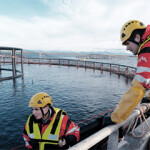China’s seafood industry asking for favors at National People’s Congress

The ongoing annual meeting of the National People’s Congress (NPC), China’s parliament, which began on 22 May, has been dominated by discussions on the impact of the coronavirus, which forced the postponement of the meeting from its original dates in March.
But within the corridors of the Great Hall of the People in Beijing, where delegates meet once a year to rubber stamp laws drafted by the Communist Party, delegates from the fishing industry to the NPC were on the hunt for government backing for deals and carve-outs. Among them was Xia Yong Xiang, director of the Daishan Fishery Cooperative in Daishan, part of the massive east coast metropolis of Zhoushan, which has traditionally been China’s largest fishery port since the country started sending vessels to distant waters in the 1980s. Xia has been pushing for government subsidies to be refocused on Chinese vessels operating in the North Pacific and the Indian Ocean – which would help his firm, since many of its 600 vessels work those waters.
China’s distant-water fishing firms receive tax incentives and subsidies for fuel, port construction, and vessel refurbishments – all benefits not extended to the aquaculture sector. While in China the coronavirus crisis has pressed the country’s spending ability, Daishan Fishery Cooperative Director Xia defended the tax breaks for the distant-water sector, whereby any catch by a Chinese-owned vessel in international waters is allowed into China free of import duties or VAT.
Fuzhou Hong Dong Yuan Yang Fishing Co. Chairman Lan Ping Zhong, a regular voice at the NPC, went further last week, calling for China to increase its subsidies for distant-water fishing. He also asked the government to form a team of negotiators to represent China in global, regional, and state-to-state fisheries treaties and agreements. In addition to that, he asked the country to amend its Fishery Law, passed in 1986, to clarify the position of foreign staff in Chinese-owned fishing companies with fleets in international waters.
In recent years, as China’s economy has improved, Chinese distant-water fishing firms have struggled to adequately staff their vessels. Salary increases and recruitment from prisons and detention facilities has not fully met the need, so companies have been hiring workers in countries where they have operating bases.
“We need to regularize and define the role and management of foreign workers in the Fisheries Law,” Lan told reporters in a statement outside this year’s sitting of the NPC, which doesn’t broadcast its debates.
Defining China’s distant-water fishery fleet as a strategic policy tool has become a key theme in Lan’s statements at the annual NPC. Lan’s firm operates a large fisheries and fishmeal processing project in Mauritania and has ambitions to invest further in fisheries across West Africa and Latin America.
Distant-water fishing is a “strategic industry,” Lan said in a statement to media during the NPC meeting. “It is key to safeguarding China’s marine rights and to enriching the domestic market.”
Liu Han Yuan, the chairman of the Tongwei Group, a major player in China’s animal feed sector and a farmer and processor of tilapia, also attended the NPC looking to sway the governmental body to favor his industry with a legislative change. Locally farmed aquaculture products are taxed at 10 percent VAT, the rate for live animals, because much of China’s seafood is sold live at retail outlets and markets, Liu explained to fellow Communist Party members at the NPC.
But many of the country’s large pork and poultry firms don’t face the tax, as they slaughter their own animals and birds, according to Liu, who made a similar statement at last year’s NPC. He called for fair treatment for the aquaculture sector through tax reform, which Liu said is central to the government’s hopes for consolidation of China’s highly fragmented aquaculture sector. Liu wants aquaculture firms to be allowed to claim receipted expenses incurred outside their province against their total tax bill.
Another NPC delegate, Chen Ying Yu, a representative of a branch company of state-owned China Telecoms in Shantou, Guangdong Province, called for better maritime policing to prevent damage to optical cables on the ocean floor by fishing vessels. At the NPC meeting, Chen said illegal trawling is damaging China’s internet connections, detailing 43 cases of seabed cables being broken by fishing vessels entering into “optical cable protection zones.” He asked for the country’s Fisheries Law to be amended so that the Department of Agriculture is forced to police and punish fishing companies for damaging underwater cables.
Chen said the change would be for the sake of national defense, as damage to the cables harms China’s ability to connect with its offshore islands and military installations. That communication is key to China’s quest for territorial expansion in the South China Sea, where China has built several island bases through dredging. Fishing trawlers are often used as an advance party by the country’s navy, which then rushes to their aid once confronted by a third country.
Photo courtesy of Wikipedia






Share